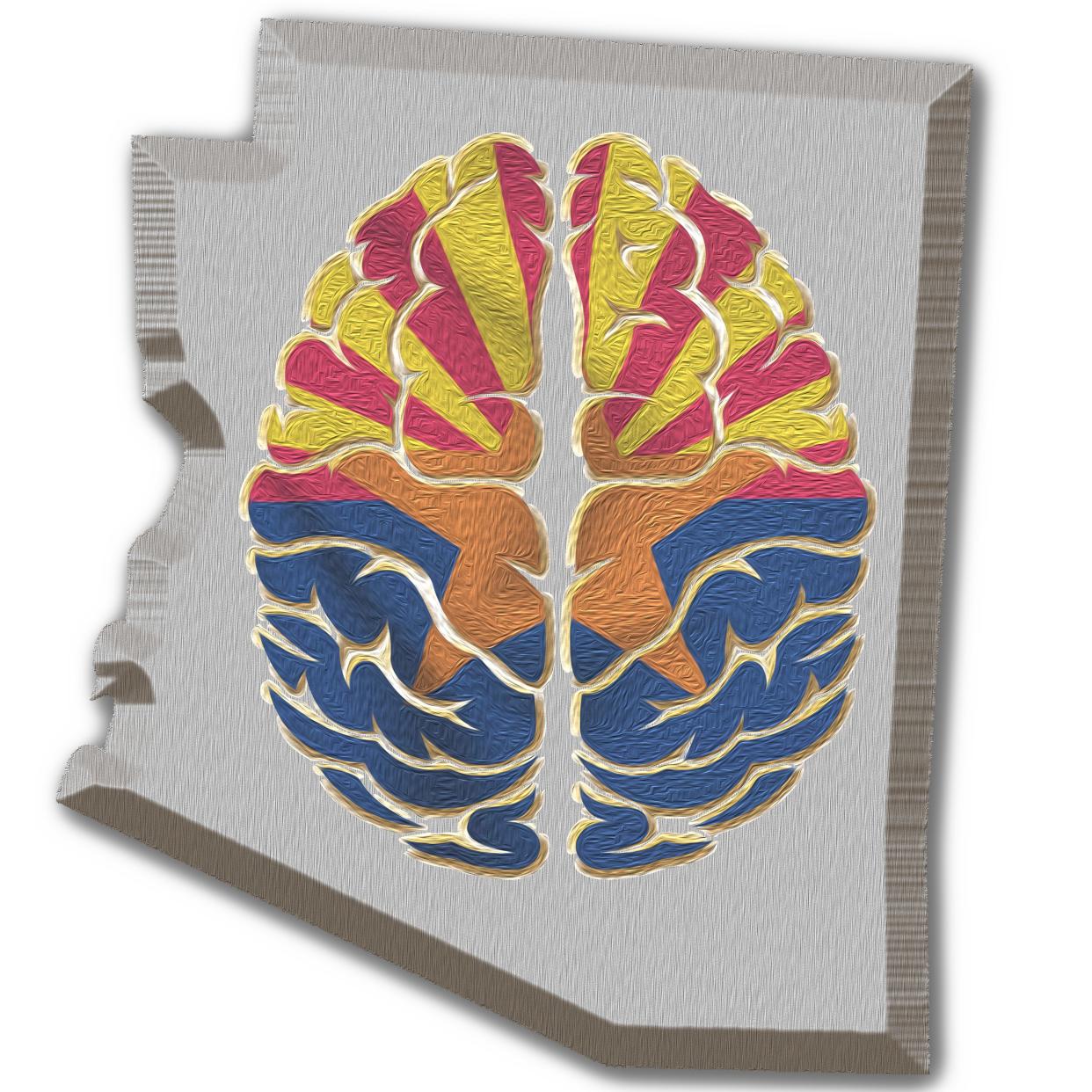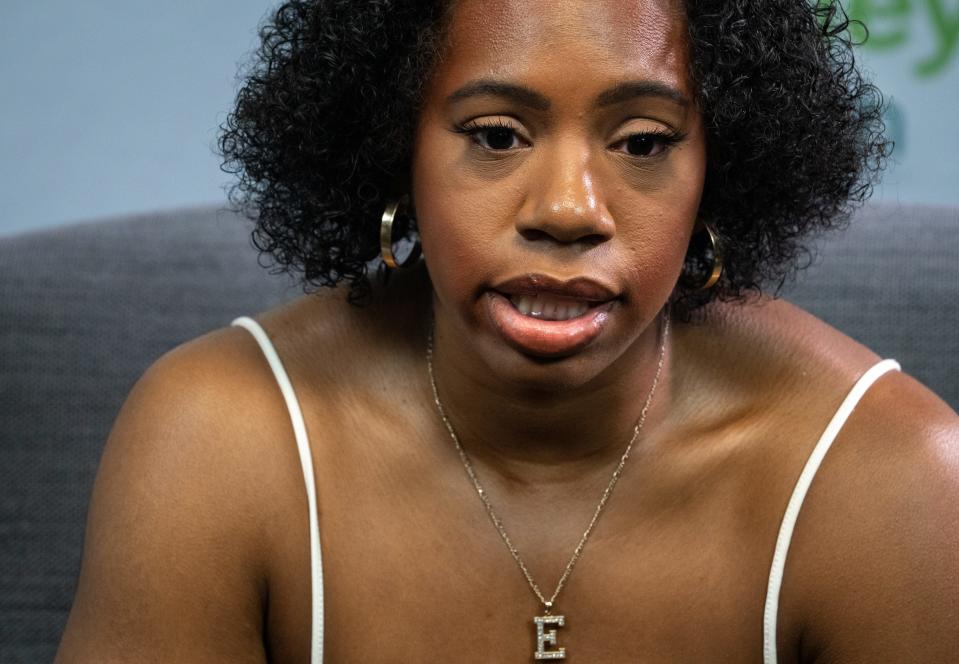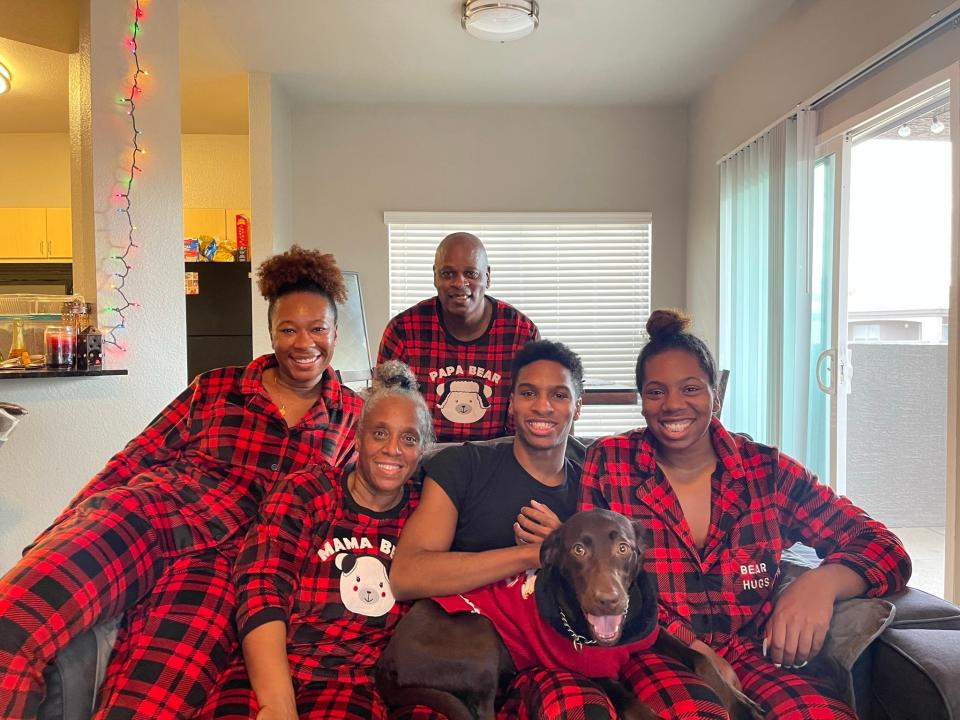Psychosis first appeared just as her life in Arizona was taking off. How one young woman found help

With her own apartment, a full-time job and a solid group of friends, Elise Lampley is a typical Arizona twenty-something, except in one respect: She is living with schizophrenia.
While there's no known cure for schizophrenia, Lampley is proof that a diagnosis of a serious mental disorder does not have to mean losing one's independence, including an ability to earn an income, live alone or enjoy travel and meaningful relationships.
Lampley is also an example of how some young people with serious mental illnesses are avoiding what is often a repetitive cycle of crises leading to emergency department visits and hospitalizations.

As post-COVID-19 staffing shortages have left dozens of inpatient psychiatric beds in Maricopa County closed, prevention programs can be a crucial part of keeping the mental health system working.
Early intervention also may prevent issues that disproportionately affect people with psychotic disorders, including permanent disability, homelessness, substance misuse and a reduced lifespan.
Although she'd been hospitalized as a psychiatric patient at least twice before getting help from a specialized treatment program through Valleywise Health in early 2019, Lampley has not been hospitalized in the four years since.
Her progress has been hard-won, and Lampley said she's still healing. Just four years ago, after weeks of struggles and unusual behavior, she became so paranoid that she tried to jump through a window in her apartment. The window shattered and cut her face. Her mother, who was with her at the time, called 911 in desperation, and police officers took her to get help.
"I just grabbed her by her shirt and kind of yanked her back," her mother, Angela Lampley, said. "That's what kept her from going all the way through (the window)."
'We want to get in there early'
Elise Lampley, her family and medical providers say that the key to her recovery was getting into treatment quickly.
"Our medications, our interventions are much different than they were 30 years ago," said Dr. Aris Mosley, a psychiatrist and medical director of the Valleywise Health First Episode Center in Avondale, where Lampley is a patient.
"With every episode of psychosis that a person has, we run the risk of lasting damage being done to the brain. That is why first episode kind of centers are so crucial. We want to get in there early."
Mosley says some of her young patients have heard their diagnosis — schizophrenia is the most common — and then asked for help signing up for disability benefits. Her response: Why?
"'That's not what we're working for. We're working toward getting you back on your feet,'" she said she tells her patients.
Valleywise Health, the public health care system for Maricopa County, plans to open its second First Episode Center in Mesa as early as June.
Roughly one in five American adults, or 52 million people, is experiencing a mental illness, and about 5% of U.S. adults, or 13 million people, have a severe mental illness, according to estimates from Mental Health America.
Schizophrenia affects about 1% of the population, which in Arizona works out to about 73,000 people.
Population statistics indicate a need for at least 10 more first episode programs to serve all the young people who experience psychosis in Maricopa County, said Dr. Alicia Cowdry, the outpatient medical director of behavioral health services at Valleywise. Cowdry characterized the need for such programs as "huge" and Mosley said first episode programs are "crucial to behavioral health of the future."
The work that first episode centers are doing is "100% a key step" to preventing people from seeking higher levels of care like crisis services and inpatient hospitalization, said Joel Conger, Arizona market president for Connections Health Solutions. That company provides urgent psychiatric crisis care in both Tucson and Phoenix and sees about 30,000 patients per year.
'I've got the space and I can't use it': Why psychiatric beds in Phoenix area remain empty
The case for early intervention
For many people who experience a psychotic episode, early intervention does not always happen.
The first symptoms often show up at a pivotal age — in young adulthood, which is also a time when stressors such as starting college or getting a first job could explain away unusual behavior.
Family and friends may shrug off or ignore early warning signs. Some may be unwilling to accept that their loved one has experienced an episode of psychosis. Or there may not be a first-episode program nearby to provide help.
Research "strongly suggests" that the first few years after the onset of psychotic symptoms is a critical period for intervention, researchers from Ohio State University, Kent State University and the University of Michigan wrote in a 2018 article published in the journal Risk Management and Healthcare Policy.
That's when the majority of the decline in health and functioning unfolds, and it's also when individuals with psychosis experience the greatest therapeutic response to treatments, the authors wrote.
Related: New hospital in Mesa seeks to address bed shortage for mental health patients
British researchers in 2016 published a three-year study of 3,674 people between the ages of 16 and 35 years with a diagnosis of psychosis and found that early intervention treatment was associated with better health and social outcomes, as well as reduced costs.
There's been significant growth worldwide of first episode programs like the one that ended up helping Lampley. Typically they provide a team approach to treating people who have experienced their first psychotic break.

In addition to Mosley, the Valleywise team includes case managers, a nurse, a therapist, a specialist dedicated to helping patients with jobs and school, and a peer-support specialist who is living with serious mental illness and can provide help through the lens of firsthand experience.
The center refers to patients not as patients but "members" and speaks about "brain health" rather than mental illness. Mosley says it's time for society and the mental health system to stop making people with serious brain health problems "feel like they are broken, that they did something wrong and that they have something to hide."
In addition to early intervention, we all need to change the way we speak about brain health, she said.
The Valleywise center opened in 2017 near 107th Avenue and Camelback Road and moved to the West Valley city of Avondale in 2018.
It was created for teens and young adults who have had their first episode of psychosis due to a primary psychotic disorder like schizophreniform disorder or schizophrenia. As of April 18, the center had about 90 patients from ages 15 to 32, leaders say.
The Valleywise first episode program in Avondale is one of at least three such centers actively operating in Arizona.
There's one in Phoenix operated by Resilient Health that began in 2018, and a program called the EPICenter that began in 2010 and is located in the Banner-University Medicine Whole Health Clinic in Tucson. The Tucson program has an average of 85 patients at any given time and has a waiting list, program leaders said.
One significant benefit of such programs is they help keep people out of psychiatric hospitals. That's important right now as health provider shortages mean some people experiencing a mental health crisis end up lingering in hospital emergency departments and urgent psychiatric crisis centers while they wait for an inpatient bed.
Valleywise Health is Maricopa County's largest provider of inpatient psychiatric beds for court-ordered treatment, but for about a year, it has had to keep dozens of those beds closed because of staffing shortages. As of May 11, Valleywise officials said 21%, or 88, of its psychiatric beds were closed.
Medications are 'part of the healing process'
Lampley, who recently celebrated her 28th birthday, lives in Pinal County. She loves to exercise, whether it's weightlifting or hiking. She has a workout routine, a dog named Keiko she acquired during the COVID-19 pandemic, and enjoys watching the show "Succession" with friends at gatherings they call "Succession Sundays."

An Instagram account she maintains focuses on wellness, and she's quick to rattle off a list of brunch places she likes, such as Brunch & Sip, Hash Kitchen and Snooze. She's been to some of those places after group hikes with other young patients and staff members from the First Episode Center.
While she's got a full-time job in customer service, Lampley would like to go back to working as a chemical engineer, which she'd been doing when her symptoms first emerged. And she's got other goals, too, including taking a trip to Europe with her friends this year.
Mosley sees no reason why Lampley wouldn't be able to work as a chemical engineer again.
The aim, Mosley says, is to keep young people on the lowest dose of medication that's possible for that person to take while also keeping them well.
Psychosis is caused by a spike of the chemical dopamine in the brain, and the medications used for treatment after a psychotic episode help bring dopamine back down to the appropriate level for each individual's brain, she said.
"The medication is protective from further episodes. That doesn't mean people can't have symptoms of psychosis while on meds. It happens. You just have to adjust the medications," Mosley said.
"I do believe that the brain takes the longest to heal out of any other part of the body," Mosley said, adding that medications are part of the healing process.
She emphasizes that second-generation medications for people who have experienced psychosis have been "game changers," citing Abilify, Risperidone and Zyprexa as examples. Those drugs don't have the same side effects as older drugs that were historically used to treat people with psychosis, such as Haldol or Thorazine, she said.
"They don't leave people feeling stuck or like a zombie," she said of the newer medications. "Can they? Yes, you can overmedicate anyone. But I don't get people to where Elise is by overmedicating them."
'Huge for the state': Arizona takes rare step of spending big to address nursing shortage crisis
'I didn't know what was happening, but I was afraid'
After growing up in a Chicago suburb, Lampley graduated from the University of Kentucky with a degree in chemical engineering in December 2017. After graduation, she moved to Arizona to take an engineering job with a tech company in Chandler, where she also got an apartment.
Lampley is one of three children in a tight-knit family. Her parents, Angela and Lemone, drove across the country with their daughter to get her settled in Chandler and were quick to return several months later when she began acting out of character.

"I didn't know what was happening, but I was afraid," Lampley said in a recent interview. "I remember not sleeping. But I think if I had been in a stable type of mind, I would have been looking for help. I didn't know where to start."
Her symptoms began with anxiety and an inability to sleep. The anxiety escalated into paranoia, and Lampley recalls feeling as though people wanted to hurt her.
She began barricading herself in her apartment. When family friends came over to check on her, she recognized their voices but thought they were imposters.
'I thought my life was over'
Psychosis affects about 3% of people at some point in their lives, according to a 2017 report from the National Alliance on Mental Illness. Symptoms may include hallucinations, delusions, speech that does not make sense, difficulty thinking clearly, lack of self-care, withdrawal and odd or inappropriate behavior.
"It's a change in the person's experience of the world around them," Mosley said. "What the individual is experiencing is 100% real to them because that is the power of the brain."
Psychosis can have a multitude of causes, including certain medications such as steroids, a lack of sleep or a significant episode of depression, anxiety, and trauma. Some people may experience only a single episode. For others like Lampley, it's a symptom of a chronic mental illness.
More: Serious mental illness often emerges in young adulthood. Here's how to get help
After the incident with the window, Lampley was hospitalized and got a diagnosis of schizophreniform disorder, which is schizophrenia symptoms that have lasted six months or less. After six months, her diagnosis changed to schizophrenia, which is a lifelong disorder.
"I thought my life was over," Lampley said of hearing the diagnosis. "It was just a lot because I didn't understand it. I didn't understand why it was happening to me."
She was leery about taking medication and scared for her future, but at the First Episode Center she met other people her age who had been through similar experiences and had specialists regularly checking her progress. She's still a patient there. She goes every few weeks to get medication injections to keep her symptoms at bay. She also regularly checks in with various members of the care team.
"It just makes me feel like I'm not alone in this at all," she said. "I rely on them a lot."
When she first arrived at the Avondale program, Lampley often didn't speak. She'd just stare ahead, with her mouth open. For a while, she returned home to Illinois. But ultimately she returned to Arizona in part because of the First Episode Center. She's in touch with her family daily, and Mosley said Lampley's family support is one of the reasons she's been so successful.
The Lampley family is open about their daughter's diagnosis and they've become a resource for other families, but it wasn't always that way.
"There's a stigma with mental health and mental illness, and we tried to handle it privately because we were trying to protect our daughter," said Lampley's father, Lemone Lampley. "Eventually we did open up and share some of the things we were going through as a family."
'With the right help, it will be OK'
Well-known examples already exist of people living successfully with psychotic disorders.
Mental health policy expert Elyn Saks, who is an assistant dean at the University of Southern California Gould Law School, revealed her diagnosis of schizophrenia in her 2007 memoir, "The Center Cannot Hold: My Journey Through Madness."
American jazz trumpeter Tom Harrell has been public about his diagnosis of schizophrenia, and Beach Boys co-founder Brian Wilson has long been open about his diagnosis of schizoaffective disorder, which has similarities to schizophrenia.
Not everyone with a serious diagnosis like schizophrenia is going to have a positive outcome, even now with better medications and more knowledge about early intervention.
Some people don't want help, or, more likely, they lack the insight to accept help. If a person is not a danger to themselves or others and doesn't meet the state criteria for being persistently, acutely or gravely disabled by mental illness, the law says the person can't be ordered to get involuntary treatment.
"Do I have young people that choose to stop their medication and do not want to engage in treatment and are not on court-ordered treatment? Yes," Mosley said.
Mosley said she'll do everything in her power to help patients understand the importance of medications, but she's seen young people refuse medications, which has led to some lasting damage to the brain.
Schizophrenia and related psychotic disorders are not diagnoses that young people want to hear, but that does not mean that their world is coming to an end.
"I tell my young people that I want to get you back to the life that you want to live," she said. "That's my goal ... It's going to be OK. With the right help, it will be OK."
Reach health care reporter Stephanie Innes at Stephanie.Innes@gannett.com or at 602-444-8369. Follow her on Twitter @stephanieinnes.
This article originally appeared on Arizona Republic: How young adults in AZ get help to avoid psychiatric hospital stays

